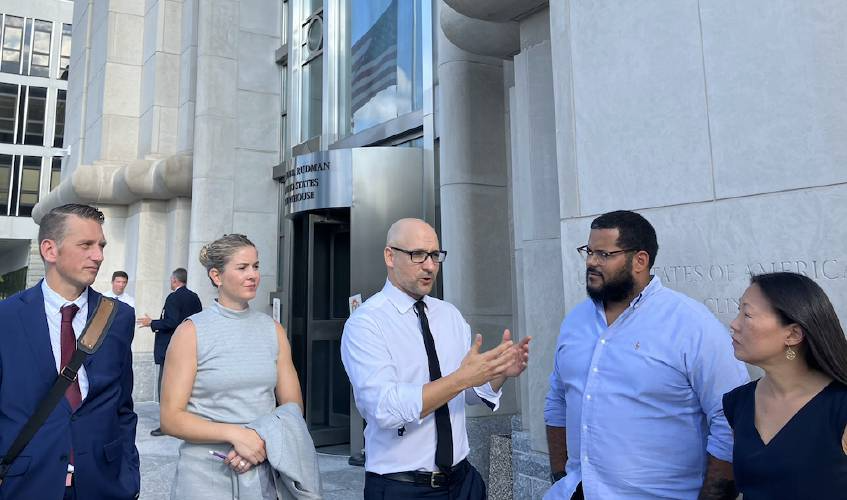By ADAM DRAPCHO, GRANITE STATE NEWS COLLABORATIVE
Gilles Bissonnette, center, legal director for the American Civil Liberties Union of New Hampshire, speaks outside the U.S. District Court for the District of New Hampshire after oral arguments in a lawsuit against the “banned concepts” law on Sept. 14. Ethan DeWitt / New Hampshire Bulletin
CONCORD – The state’s teachers' unions will need to wait at least two months to find out if a federal judge will allow their lawsuit against the state to proceed.
Judge Paul Barbadoro said on Wednesday afternoon that it will take 60 to 90 days to weigh the arguments from both sides on the merits of the suit, which argues that a new law regulating how teachers can instruct around sensitive topics is unconstitutionally vague.
A motion to dismiss the case against the state Department of Education was filed by Assistant Attorney General Samuel Garland, who is defending the state.
The question that Barbadoro posed to both Garland and to attorneys Charles Moerdler, of the New York-based Stroock law firm, and Gilles Bissonnette, of ACLU-NH, was whether the law was unconstitutionally vague even if it gave some areas of clarity, or if it should be thrown out because an imaginative lawyer could think of hypotheticals that called the law into question.
The standard for the plaintiffs is greater than in other suits, Barbadoro explained, because the suit is brought on the face of the law, a “facial challenge,” in legal speak, as opposed to a specific case where the law was applied to charge a person found in violation.
Barbadoro said he could see instances where a well-intentioned educator could violate the law accidentally, a situation he said was possible after reading the Attorney General’s previously published document addressing frequently asked questions.
“A person could unknowingly teach something that could be unintended to imply (that a banned concept is correct), and become penalized because of it,” Barbadoro said. “That is the core concern that I have.”
The suit was brought in December of 2021 by the American Federation of Teachers and National Education Association, the state’s two largest teachers’ unions, against the new law, which was called the “Right to Freedom From Discrimination in Public Workplaces and Education,” which prohibits the teaching in public schools that any person is superior to any other person based on several inherent characteristics, or that any person is inherently racist, sexist or would see others as inferior based on inherent characteristics.
“We have really significant issues such as implicit bias, which is something clearly of issue to the administrators here, the teachers here, and clearly to the drafters of the statute,” Barbadoro said, referring to a specific “safe harbor” provision of the law that protected implicit bias training.
Moerdler said the questions raised in the suit have implications beyond New Hampshire’s classrooms.
“This issue here is of critical importance to the educational system in the United States,” Moerdler said, connecting it to other recent decisions, such as preliminary injunction issued by a federal judge in Santa Cruz, California, in January of 2021, and a federal judge’s ruling last month that struck down Florida’s “Stop WOKE” law.
Moerdler said New Hampshire teachers were in a difficult position, with one law, RSA 189:11, which compels them to teach about intolerance, bigotry, antisemitism and events such as the Holocaust, and how such atrocities can be avoided in the future, and how RSA 193 says they could lose their teaching licenses if they teach that any groups are inherently inferior, superior, or oppressive.
“Can I teach and comply with the statute, or can I not teach, and comply with the other statute,” Moerdler asked.
After the hearing concluded, Tina Kim Philbotte and Andres Mejia, both Diversity Equity and Inclusion administrators and plaintiffs in the case, said they don’t know how to go about their work and comply with the state’s law.
“I think the thing that struck both of us,” when listening to the arguments, Philbotte said, “where were the students in the dialogue? There was lots of semantics, lots of law, to talk about the students’ needs was absent.”
Mejia said he would “trust the process and stay positive, keep the good vibes in this space, because, as Tina said, we’re doing this for students, teachers and residents of New Hampshire who have been historically underrepresented.”
Before she became an administrator, Philbotte was an English teacher who would assign her students Harper Lee’s 1960 novel “To Kill a Mockingbird,” which tells the story about a Black man named Tom Robinson, who is wrongfully accused of sexual assault in a small southern town.
“At the end of the book Tom Robinson was shot 17 times in the back. Inevitably, you hear (from students) that he was running away, that’s why he was shot,” Philbotte said. In light of current events, the discussion can become fraught and emotional, especially for students of color.
“Let’s talk about it, that’s what I would have done three years ago,” Philbotte said, but doubted that teachers would today feel secure in inviting that kind of dialogue in their classroom. “If I shut down that discussion, what does that say to our students?”
These articles are being shared by partners in The Granite State News Collaborative. For more information visit collaborativenh.org.

